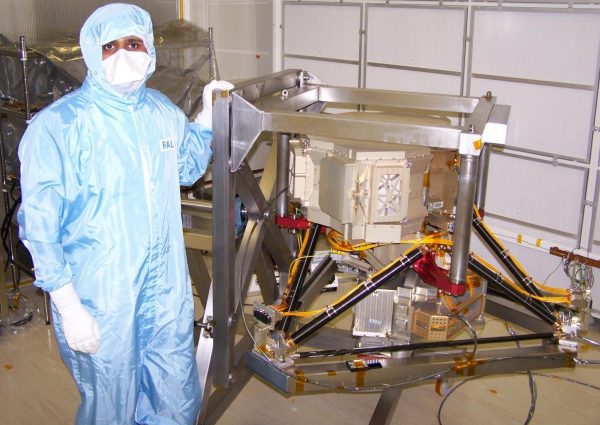What is your job – can you describe a typical day in your work life?
My job is an “electronic design engineer” for space satellites, this basically means that I design electronics that goes into space. Usually I work on scientific imaging projects that might go and take pictures of the sun or look at the light coming from distant stars. Scientists can then use this data to better understand the universe we live in and how things can impact our life here on Earth. My typical day can be quite varied; I might spend some time doing detailed design work, discussing problems with colleagues or I could be testing electronics to make sure they’ll work properly in space.
How did you get into space science?
I’ve always been fascinated by space and especially missions that have visited the moon or other planets. I find it amazing to look up at the moon and know that there are human footprints on it, or see the tiny dot of light from Mars and know that there are robotic rovers driving around on the surface. I decided that engineering seemed like a really interesting career and, if possible, I’d like to design things that would go into space. I studied Electronic Engineering at university and took every opportunity I could to gain experience relevant to working the space sector.
What interests did you have as a child?
My interests when I was young were fairly normal, from playing tennis to watching TV! But I found I always enjoyed making things and I think this probably led me towards engineering. As a teenager I always seemed to have some project on the go!
If you weren’t an engineer what would you be?
If I wasn’t an engineer I think I’d like to be a teacher – hopefully one of those fun and exciting ones!
How did you celebrate Tim Peake’s launch into space?
We had a big event at work where lots of people gathered to watch Tim’s launch on a large screen. It was great to share the excitement with colleagues and, as it was just before Christmas, there were mince pies too!
What advice would you give your eight-year-old self about building a career in space science?
My best advice would be to try and follow the things that interest you and not to be afraid to ask questions about the way things work in the world around you. I’ve always found that school, or work, is much more enjoyable if you’re interested in the things you’re doing.
Log in or sign up to the Principia Mission Space Diary website to download your own copy of the Space Diary along with teaching notes and resources.
The Principia Mission Space Diary is one of nine education projects funded by the UK Space Agency and the European Space Agency, to support the education aims of Tim Peake’s mission to the International Space Station. Find out more about the Principia education projects here.



